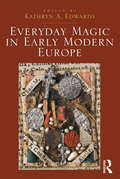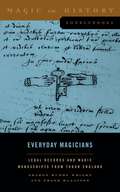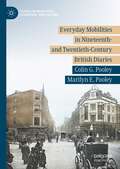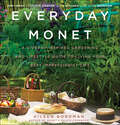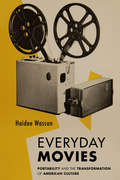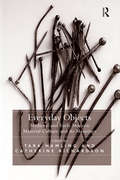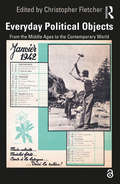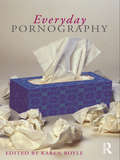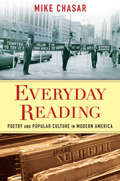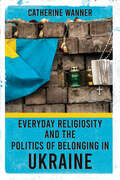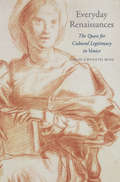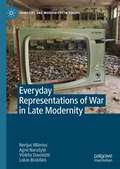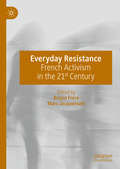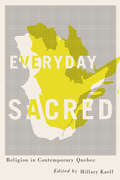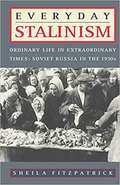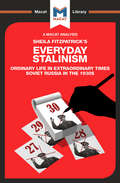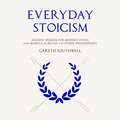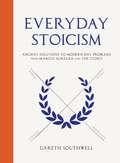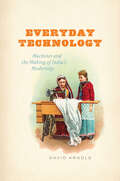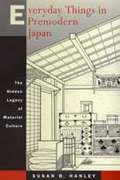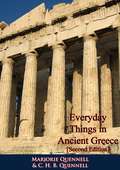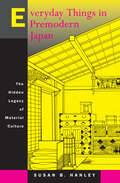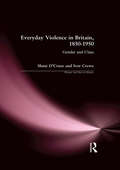- Table View
- List View
Everyday Magic in Early Modern Europe
by Kathryn A. EdwardsWhile pre-modern Europe is often seen as having an 'enchanted' or 'magical' worldview, the full implications of such labels remain inconsistently explored. Witchcraft, demonology, and debates over pious practices have provided the main avenues for treating those themes, but integrating them with other activities and ideas seen as forming an enchanted Europe has proven to be a much more difficult task. This collection offers one method of demystifying this world of everyday magic. Integrating case studies and more theoretical responses to the magical and preternatural, the authors here demonstrate that what we think of as extraordinary was often accepted as legitimate, if unusual, occurrences or practices. In their treatment of and attitudes towards spirit-assisted treasure-hunting, magical recipes, trials for sanctity, and visits by guardian angels, early modern Europeans showed more acceptance of and comfort with the extraordinary than modern scholars frequently acknowledge. Even witchcraft could be more pervasive and less threatening than many modern interpretations suggest. Magic was both mundane and mysterious in early modern Europe, and the witches who practiced it could in many ways be quite ordinary members of their communities. The vivid cases described in this volume should make the reader question how to distinguish the ordinary and extraordinary and the extent to which those terms need to be redefined for an early modern context. They should also make more immediate a world in which magic was an everyday occurrence.
Everyday Magicians: Legal Records and Magic Manuscripts from Tudor England (Magic in History Sourcebooks)
by Frank Klaassen Sharon Hubbs WrightMost of the women and men who practiced magic in Tudor England were not hanged or burned as witches, despite being active members of their communities. These everyday magicians responded to common human problems such as the vagaries of money, love, property, and influence, and they were essential to the smooth functioning of English society. This illuminating book tells their stories through the legal texts in which they are named and the magic books that record their practices.In legal terms, their magic fell into the category of sin or petty crime, the sort that appeared in the lower courts and most often in church courts. Despite their relatively lowly status, scripts for the sorts of magic they practiced were recorded in contemporary manuscripts. Juxtaposing and contextualizing the legal and magic manuscript records creates an unusually rich field to explore the social aspects of magic practice. Expertly constructed for both classroom use and independent study, this book presents in modern English the legal documents and magic texts relevant to ordinary forms of magic practiced in Tudor England. These are accompanied by scholarly introductions with original perspectives on the subjects. Topics covered include: the London cunning man Robert Allen; magic to identify thieves; love magic; magic for hunting, fishing and gambling, and magic for healing and protection.
Everyday Mobilities in Nineteenth- and Twentieth-Century British Diaries (Studies in Mobilities, Literature, and Culture)
by Colin G. Pooley Marilyn E. PooleyThis book uses diaries written by ordinary British people over the past two centuries to examine and explain the nature and extent of everyday mobilities, such as travel to school, to work, to shop or to visit friends, and to explore the meanings attached to these mobilities. After a critical evaluation of diary writing, the ways in which mobility changed over time, interacted with new forms of transport technology, and varied from place to place are examined. Further chapters focus on the roles of family and life course, gender, income and class, and journey purpose in shaping mobilities, including immobility. It is argued that easy and frequent everyday mobilities were experienced by most of the diarists studied, that travellers could exercise their own agency to adapt easily to new forms of transport technology, but that factors such as gender, class, and location also created significant mobility inequalities.
Everyday Monet: A Giverny-Inspired Gardening and Lifestyle Guide to Living Your Best Impressionist Life ("rebel Inc. " Classics Ser. #17)
by Aileen BordmanBring Monet’s paintings and gardens to life using this gorgeously illustrated book that will teach you how to create a Monet lifestyle from your living room to your kitchen to your garden—from the documentarian and author of Monet’s Palate Cookbook, with the support of the American steward and all the head gardeners at Giverny.Aileen Bordman has long been influenced by the work of Claude Monet, one of the founders of French Impressionist painting whose esteemed works capturing the simple beauties of fin de siècle French life—from waterlilies to haystacks—have fetched astonishing sums at private auction houses and can be found in the greatest art museums around the globe. With direct access to Giverny through a pair of insiders—her mother, a steward of the Giverny estate, and its head gardener—she transports you to Monet’s garden at Giverny, the third most visited site in France, in Everyday Monet.Combining the history, palette colors, and designs of Monet’s gardens and paintings in this one-of-a-kind volume, Aileen shows how to encapsulate a home and lifestyle inspired by the artist. Filled with insights, step-by-step instructions, musings, recipes, gorgeous photography, and how-to graphics, Everyday Monet teaches how to grow a garden like Monet, preserve a waterlily inside the home, decorate a dining room table or a bathroom inspired by Monet’s aesthetic, and prepare foods that inspire your inner-Impressionist.Filled with lush photos of Monet’s milieu—from the gardens of Giverny to the streets of Normandy—and reproductions of Monet’s most famous paintings, Everyday Monet is a practical guide to finding ways to implement Monet’s beautiful designs into any home and garden, whether you live on a country estate or in a city apartment, and is a memorable keepsake Monet devotees will treasure.
Everyday Movies: Portable Film Projectors and the Transformation of American Culture
by Haidee WassonEveryday Movies documents the twentieth-century rise of portable film projectors. It demonstrates that since World War II, the vast majority of movie-watching did not happen in the glow of the large screen but rather took place alongside the glitches, distortions, and clickety-clack of small machines that transformed home, classroom, museum, community, government, industrial, and military venues into sites of moving-image display. Reorienting the history of cinema away from the magic of the movie theater, Haidee Wasson illustrates the remarkable persistence and proliferation of devices that fundamentally rejected the sleek, highly professionalized film show. She foregrounds instead another kind of apparatus, one that was accessible, affordable, adaptable, easy to use, and crucially, programmable. Revealing rich archival discoveries, this book charts a compelling and original history of film that brings to light new technologies and diverse forms of media engagement that continue to shape contemporary life.
Everyday Objects: Medieval and Early Modern Material Culture and its Meanings
by Catherine Richardson Tara HamlingThis book is about the objects people owned and how they used them. Twenty-three specially written essays investigate the type of things that might have been considered 'everyday objects' in the medieval and early modern periods, and how they help us to understand the daily lives of those individuals for whom few other types of evidence survive - for instance people of lower status and women of all status groups. Everyday Objects presents new research by specialists from a range of disciplines to assess what the study of material culture can contribute to our understanding of medieval and early modern societies. Extending and developing key debates in the study of the everyday, the chapters provide analysis of such things as ceramics, illustrated manuscripts, pins, handbells, carved chimneypieces, clothing, drinking vessels, bagpipes, paintings, shoes, religious icons and the built fabric of domestic houses and guild halls. These things are examined in relation to central themes of pre-modern history; for instance gender, identity, space, morality, skill, value, ritual, use, belief, public and private behaviour, continental influence, materiality, emotion, technical innovation, status, competition and social mobility. This book offers both a collection of new research by a diverse range of specialists and a source book of current methodological approaches for the study of pre-modern material culture. The multi-disciplinary analysis of these 'everyday objects' by archaeologists, art historians, literary scholars, historians, conservators and museum practitioners provides a snapshot of current methodological approaches within the humanities. Although analysis of material culture has become an increasingly important aspect of the study of the past, previous research in this area has often remained confined to subject-specific boundaries. This book will therefore be an invaluable resource for researchers and students interested in learning about important new work which demonstrates the potential of material culture study to cut across traditional historiographies and disciplinary boundaries and access the lived experience of individuals in the past.
Everyday Political Objects: From the Middle Ages to the Contemporary World
by Christopher FletcherEveryday Political Objects examines a series of historical case studies across a very broad timescale, using objects as a means to develop different approaches to understanding politics where both internal and external definitions of the political prove inadequate. Materiality and objects have gradually made their way into the historian’s toolbox in recent years, but the distinctive contribution that a set of methods developed for the study of objects can make to our understanding of politics has yet to be explored. This book shows how everyday objects play a certain role in politics,which is specific to material things. It provides case studies which re-orientate the view of the political in a way that is distinct from, but complementary to, the study of political institutions, the social history of politics and the analysis of discourse. Each chapter shows, in a distinctive and innovative way, how historians might change their approach to politics by incorporating objects into their methodology. Analysing case studies from France, the Congo, Burkina Faso, Romania and Britain between the early Middle Ages and the present day makes this study the perfect tool for students and scholars in the disciplines of history, art history, political science, anthropology and archaeology.
Everyday Pornography
by Karen BoylePublic and academic debate about ‘porn culture’ is proliferating. Ironically, what is often lost in these debates is a sense of what is specific about pornography. By focusing on pornography’s mainstream – contemporary commercial products for a heterosexual male audience – Everyday Pornography offers the opportunity to reconsider what it is that makes pornography a specific form of industrial practice and genre of representation. Everyday Pornography presents original work from scholars from a range of academic disciplines (Media Studies, Law, Sociology, Psychology, Women’s Studies, Political Science), introducing new methodologies and approaches whilst reflecting on the ongoing value of older approaches. Among the topics explored are: the porn industry’s marketing practices (spam emails, reviews) and online organisation commercial sex in Second Life the pornographic narratives of phone sex and amateur videos the content of best-selling porn videos how the male consumer is addressed by pornography, represented within the mainstream, understood by academics and contained by legislation. This collection places a particular emphasis on anti-pornography feminism, a movement which has been experiencing a revival since the mid-2000s. Drawing on the experiences of activists alongside academics, Everyday Pornography offers an opportunity to explore the intellectual and political challenges of anti-pornography feminism and consider its relevance for contemporary academic debate.
Everyday Reading: Poetry and Popular Culture in Modern America
by Mike ChasarExploring poetry scrapbooks, old-time radio show recordings, advertising verse, corporate archives, and Hallmark greeting cards, among other unconventional sources, Mike Chasar casts American poetry as an everyday phenomenon consumed and created by a vast range of readers. He shows how American poetry in the first half of the twentieth century and its reception helped set the stage for the dynamics of popular culture and mass media today. Poetry was then part and parcel of American popular culture, spreading rapidly as the consumer economy expanded and companies exploited its profit-making potential. Poetry also offered ordinary Americans creative, emotional, political, and intellectual modes of expression, whether through scrapbooking, participation in radio programs, or poetry contests. Reenvisioning the uses of twentieth-century poetry, Chasar provides a richer understanding of the innovations of modernist and avant-garde poets and the American reading public's sophisticated powers of feeling and perception.
Everyday Religiosity and the Politics of Belonging in Ukraine
by Catherine WannerEveryday Religiosity and the Politics of Belonging in Ukraine reveals how and why religion has become a pivotal political force in a society struggling to overcome the legacy of its entangled past with Russia and chart a new future. If Ukraine is "ground zero" in the tensions between Russia and the West, religion is an arena where the consequences of conflicts between Russia and Ukraine keenly play out. Vibrant forms of everyday religiosity pave the way for religion to be weaponized and securitized to advance political agendas in Ukraine and beyond. These practices, Catherine Wanner argues, enable religiosity to be increasingly present in public spaces, public institutions, and wartime politics in a pluralist society that claims to be secular. Based on ethnographic data and interviews conducted since before the Revolution of Dignity and the outbreak of armed combat in 2014, Wanner investigates the conditions that catapulted religiosity, religious institutions, and religious leaders to the forefront of politics and geopolitics.
Everyday Renaissances: The Quest For Cultural Legitimacy In Venice (I Tatti studies in Italian Renaissance history #18)
by Sarah Gwyneth RossRevealing an Italian Renaissance beyond Michelangelo and the Medici, Sarah Gwyneth Ross recovers the experiences of everyday people who were inspired to pursue humanistic learning. Physicians were often the most avid professionals seeking to earn the respect of their betters, advance their families, and secure honorable remembrance after death.
Everyday Representations of War in Late Modernity (Identities and Modernities in Europe)
by Violeta Davoliūtė Nerijus Milerius Agnė Narušytė Lukas BrašiškisThis book analyses photographic and cinematographic representations of war and its memorialisation rituals in the period of late modernity from the perspectives of cultural sociology, philosophy, art theory and film studies. It reveals how the experience of war trauma takes root in everydayness and shows how artists try to question the ‘normality’ of the everyday, to actualise the memory of war trauma, to rethink the contrasting experiences of the time of war and everydayness, and to oppose the imposed historical narratives. The new representations are analysed by developing theories of war as a ‘magic spectacle’, also by using such concepts as spectres, triumph and trauma, collective social catastrophes, forensic architecture and others.
Everyday Resistance: French Activism in the 21st Century
by Bruno Frère Marc JacquemainThis book studies those who, in various domains of life, are resisting the increasingly harsh day-to-day pressures of “late capitalism,” centering mainly on French examples. Far from the global euphoria of the sixties and seventies, everyday people are trying to loosen the grip of injustice in very concrete ways: people experiencing homelessness try to occupy and live in empty buildings; collectives of small farmers and consumers avoid long (and costly) commercial supply chains to defend their common interests; students and teachers organize to prevent the expulsion of undocumented migrants; and activists in the free software movement fight for the “common ownership” of software and of the Internet. Through civil disobedience in the midst of daily life, people are trying to resist, work against, and change laws that protect the interests of firms and corporations considered socially or ecologically unfair.
Everyday Sacred: Religion in Contemporary Quebec (Advancing Studies in Religion #3)
by Hillary KaellOver the last decade there has been ongoing discussion about the place of religion in Québécois society, particularly following the proposed Charter of Quebec Values in 2013. The essays in Everyday Sacred emerged from this active and often tense period of debate. Revitalizing an awareness of how people encounter, create, and employ religion in everyday life, contributors to this volume explore communities’ networks of beliefs, traditions, and relationships. Through broad comparisons beyond the Quebec context, contributors look at African Pentecostal congregations, an Iraqi Jewish community in Montreal, a rural Catholic parish on the Saint Lawrence River, and Tewehikan drumming in Wemotaci. They also examine wayside crosses, places of pilgrimage and devotion, debates on the regulation of the hijab, and the place of Montreal Spiritualists and transhumanists in the religious landscape. Seeking a holistic definition of Québécois religion, Everyday Sacred considers religious and secular identity, pluralism, the bodily and material aspects of religion, the impact of gender on community and the public sphere, and the rise of hybridity, sociality, and new technologies in transnational and online networks, in order to uncover the transmission of practices and beliefs from one generation to another. Disrupting familiar dichotomies between Catholicism and other religions, “founders” and immigrants, new religious movements and traditional institutions, Everyday Sacred marks the beginning of a sustained conversation on contemporary religion in Quebec, both inside and outside of the province. Contributors include: Emma Anderson (University of Ottawa), Randall Balmer (Dartmouth College), Hélène Charron (Université Laval), Elysia Guzik (University of Toronto), Laurent Jérôme (Université du Québec à Montréal), Norma B. Joseph (Concordia University), Cory Andrew Labrecque (Université Laval), Deirdre Meintel (Université de Montréal), Géraldine Mossière (Université de Montréal), Frédéric Parent (Université de Québec à Montréal), Meena Sharify-Funk (Wilfrid Laurier University).
Everyday Silence and the Holocaust
by Irene LevinEveryday Silence and the Holocaust examines Irene Levin’s experiences of her family’s unspoken history of the Holocaust and the silence that surrounded their war experiences as non-topics.A central example of what C. Wright Mills considered the core of sociology – the intersection of biography and history – the book covers the process by which the author came to understand that notes found in her mother’s apartment following her death were not unimportant scribbles, but in fact contained elements of her mother’s biographical narrative, recording her parents’ escape from occupied Norway to unoccupied Sweden in late 1942. From the mid-1990s, when society began to open up about the atrocities committed against the Jews, so too did the author find that her mother and the wider Jewish population ceased to be silent about their war experiences and began to talk. Charting the process by which the author traced the family’s broader history, this book explores the use of silence, whether in the family or in society more widely, as a powerful analytic tool and examines how these silences can intertwine. This book provides insight into social processes often viewed through a macro-historical lens by way of analysis of the life of an "ordinary" Jewish woman as a survivor.An engaging, grounded study of the biographical method in sociology and the role played by silence, this book will appeal to readers with an interest in the Holocaust and World War II, as well as in social scientific research methods. It will be of use to both undergraduate and postgraduate scholars in the fields of history, social science, psychology, philosophy, and the history of ideas.The Open Access version of this book, available at http://www.taylorfrancis.com, has been made available under a Creative Commons [Attribution-Non Commercial-No Derivatives (CC-BY-NC-ND)] 4.0 license.
Everyday Stalinism: Ordinary Life In Extraordinary Times: Soviet Russia In The 1930s
by Sheila FitzpatrickHere is a pioneering account of everyday life under Stalin, written by one of our foremost authorities on modern Russian history. Focusing on urban areas in the 1930s, Sheila Fitzpatrick shows that with the adoption of collectivization and the first Five-Year Plan, everyday life was utterly transformed. With the abolition of the market, shortages of food, clothing, and all kinds of consumer goods became endemic. As peasants fled the collectivized villages, major cities were soon in the grip of an acute housing crisis, with families jammed for decades in tiny single rooms in communal apartments, counting living space in square meters. It was a world of privation, overcrowding, endless queues, and broken families, in which the regime's promises of future socialist abundance rang hollowly. We read of a government bureaucracy that often turned everyday life into a nightmare, and of the ways that ordinary citizens tried to circumvent it, primarily by patronage and the ubiquitous system of personal connections known as blat . And we read of the police surveillance that was endemic to this society, and the waves of terror like the Great Purges of 1937, that periodically cast this world into turmoil. Fitzpatrick illuminates the ways that Soviet city-dwellers coped with this world, examining such diverse activities as shopping, traveling, telling jokes, finding an apartment, getting an education, landing a job, cultivating patrons and connections, marrying and raising a family, writing complaints and denunciations, voting, and trying to steer clear of the secret police. Based on extensive research in Soviet archives only recently opened to historians, this superb book illuminates the ways ordinary people tried to live normal lives under extraordinary circumstances.
Everyday Stalinism: Soviet Russia in the 1930s
by Riley Quinn Victor PetrovHow was the Soviet Union like a soup kitchen? In this important and highly revisionist work, historian Sheila Fitzpatrick explains that a reimagining of the Communist state as a provider of goods for the ‘deserving poor’ can be seen as a powerful metaphor for understanding Soviet life as a whole. By positioning the state both as a provider and as a relief agency, Fitzpatrick establishes it as not so much a prison (the metaphor favoured by many of her predecessors), but more the agency that made possible a way of life. Fitzpatrick’s real claim to originality, however, is to look at the relationship between the all-powerful totalitarian government and its own people from both sides – and to demonstrate that the Soviet people were not totally devoid of either agency or resources. Rather, they successfully developed practices that helped them to navigate everyday life at a time of considerable danger and multiple shortages. For many, Fitzpatrick shows, becoming an informer and reporting fellow citizens – even family and friends – to the state was a successful survival strategy. Fitzpatrick's work is noted mainly as an example of the critical thinking skill of reasoning; she marshals evidence and arguments to deliver a highly persuasive revisionist description of everyday life in Soviet time. However, her book has been criticized for the way in which it deals with possible counter-arguments, not least the charge that many of the interviewees on whose experiences she bases much of her analysis were not typical products of the Soviet system.
Everyday Stoicism: Ancient Solutions to Modern Day Problems from Marcus Aurelius and the Stoics
by Gareth SouthwellGrow in wisdom with this practical guide to Stoic philosophy for modern day-to-day lifeDiscover the path to a more contented, fulfilled life through the teachings of Stoic philosophers, from Marcus Aurelius to Epictetus. Learn how to build resilience, foster inner peace, and harness self-control.Stoic philosophy is not an armchair philosophy: it was designed by the ancient Greek and Roman philosophers to be used in day-to-day life, and their teachings offer a host of simple, practical ideas to maximise positivity in our lives.Tackling a key theme each month, from Happiness and Health to Money and Politics, Everyday Stoicism guides you through the calendar year to build a toolkit of simple exercises and practical ideas for how to live these values every day.So, harness the collective wisdom of the ancient Stoic philosophers today and discover the joy of everyday stoicism.
Everyday Stoicism: Ancient Solutions to Modern Day Problems from Marcus Aurelius and the Stoics
by Gareth SouthwellGrow in wisdom with this practical guide to Stoic philosophy for modern day-to-day lifeDiscover the path to a more contented, fulfilled life through the teachings of Stoic philosophers, from Marcus Aurelius to Epictetus. Learn how to build resilience, foster inner peace, and harness self-control.Stoic philosophy is not an armchair philosophy: it was designed by the ancient Greek and Roman philosophers to be used in day-to-day life, and their teachings offer a host of simple, practical ideas to maximise positivity in our lives.Tackling a key theme each month, from Happiness and Health to Money and Politics, Everyday Stoicism guides you through the calendar year to build a toolkit of simple exercises and practical ideas for how to live these values every day.So, harness the collective wisdom of the ancient Stoic philosophers today and discover the joy of everyday stoicism.
Everyday Stoicism: Ancient Solutions to Modern Day Problems from Marcus Aurelius and the Stoics
by Gareth SouthwellGrow in wisdom with this practical guide to Stoic philosophy for modern day-to-day lifeDiscover the path to a more contented, fulfilled life through the teachings of Stoic philosophers, from Marcus Aurelius to Epictetus. Learn how to build resilience, foster inner peace, and harness self-control.Stoic philosophy is not an armchair philosophy: it was designed by the ancient Greek and Roman philosophers to be used in day-to-day life, and their teachings offer a host of simple, practical ideas to maximise positivity in our lives.Tackling a key theme each month, from Happiness and Health to Money and Politics, Everyday Stoicism guides you through the calendar year to build a toolkit of simple exercises and practical ideas for how to live these values every day.So, harness the collective wisdom of the ancient Stoic philosophers today and discover the joy of everyday stoicism.
Everyday Technology: Machines and the Making of India's Modernity
by David ArnoldIn 1909 Mohandas Karamchand Gandhi, on his way back to South Africa from London, wrote his now celebrated tract Hind Swaraj, laying out his vision for the future of India and famously rejecting the technological innovations of Western civilization. Despite his protestations, Western technology endured and helped to make India one of the leading economies in our globalized world. Few would question the dominant role that technology plays in modern life, but to fully understand how India first advanced into technological modernity, argues David Arnold, we must consider the technology of the everyday. Everyday Technology is a pioneering account of how small machines and consumer goods that originated in Europe and North America became objects of everyday use in India in the late nineteenth and early twentieth centuries. Rather than investigate “big” technologies such as railways and irrigation projects, Arnold examines the assimilation and appropriation of bicycles, rice mills, sewing machines, and typewriters in India, and follows their impact on the ways in which people worked and traveled, the clothes they wore, and the kind of food they ate. But the effects of these machines were not limited to the daily rituals of Indian society, and Arnold demonstrates how such small-scale technologies became integral to new ways of thinking about class, race, and gender, as well as about the politics of colonial rule and Indian nationhood. Arnold’s fascinating book offers new perspectives on the globalization of modern technologies and shows us that to truly understand what modernity became, we need to look at the everyday experiences of people in all walks of life, taking stock of how they repurposed small technologies to reinvent their world and themselves.
Everyday Things In Premodern Japan: The Hidden Legacy Of Material Culture
by Susan HanleyJapan was the only non-Western nation to industrialize before 1900 and its leap into the modern era has stimulated vigorous debates among historians and social scientists. In an innovative discussion that posits the importance of physical well-being as a key indicator of living standards, Susan B. Hanley considers daily life in the three centuries leading up to the modern era in Japan. She concludes that people lived much better than has been previously understood—at levels equal or superior to their Western contemporaries. She goes on to illustrate how this high level of physical well-being had important consequences for Japan's ability to industrialize rapidly and for the comparatively smooth transition to a modern, industrial society. <p><p> While others have used income levels to conclude that the Japanese household was relatively poor in those centuries, Hanley examines the material culture—food, sanitation, housing, and transportation. How did ordinary people conserve the limited resources available in this small island country? What foods made up the daily diet and how were they prepared? How were human wastes disposed of? How long did people live? Hanley answers all these questions and more in an accessible style and with frequent comparisons with Western lifestyles. Her methods allow for cross-cultural comparisons between Japan and the West as well as Japan and the rest of Asia. They will be useful to anyone interested in the effects of modernization on daily life.
Everyday Things in Ancient Greece [Second Edition]
by Kathleen Freeman C. H. B. Quennell Marjorie QuennellFirst published in 1954, this is the Second Edition of the single-volume amalgamation of husband-and-wife team Marjorie and Charles Quinnells’ three-volume anthology on Greek antiquity, originally between 1929-1932: Everyday Things in Homeric Greece, Everyday Things in Archaic Greece, and Everyday Things in Classical Greece.Part I tells of the Trojan War and of the heroes who sustained the Greeks in their early struggles, with Homer cited as the main source.Part II deals with the Archaic period (about 560 to 480 B.C.) ending with the great struggle between Greeks and Persians which culminated in the victory of the Greeks at Salamis, as related in the History of Herodotus.Part III begins with the story of how the Greeks went to work after Salamis and built on the well-laid foundations a civilization which ever since has been regarded as Classical and closes with the account in the History of Thucydides of the struggle between Athens and Sparta and the failure of the Athenian Expedition to Sicily.A comprehensive study of Ancient Greek History, revised in this edition by Greek authority Kathleen Freeman.“In this book we have attempted to show some of the beautiful products of these artists, and their use in everyday life. It is our hope that the boys and girls who read it will discover that the Greeks were not a people extremely foreign and remote, who spoke a difficult language, but folk much like themselves, who lived and worked and played in the surroundings and among the objects we have depicted and described.”—Preface
Everyday Things in Premodern Japan: The Hidden Legacy of Material Culture
by Susan B. HanleyJapan was the only non-Western nation to industrialize before 1900 and its leap into the modern era has stimulated vigorous debates among historians and social scientists. In an innovative discussion that posits the importance of physical well-being as a key indicator of living standards, Susan B. Hanley considers daily life in the three centuries leading up to the modern era in Japan. She concludes that people lived much better than has been previously understood—at levels equal or superior to their Western contemporaries. She goes on to illustrate how this high level of physical well-being had important consequences for Japan's ability to industrialize rapidly and for the comparatively smooth transition to a modern, industrial society.While others have used income levels to conclude that the Japanese household was relatively poor in those centuries, Hanley examines the material culture—food, sanitation, housing, and transportation. How did ordinary people conserve the limited resources available in this small island country? What foods made up the daily diet and how were they prepared? How were human wastes disposed of? How long did people live? Hanley answers all these questions and more in an accessible style and with frequent comparisons with Western lifestyles. Her methods allow for cross-cultural comparisons between Japan and the West as well as Japan and the rest of Asia. They will be useful to anyone interested in the effects of modernization on daily life.
Everyday Violence in Britain, 1850-1950: Gender and Class (Women And Men In History)
by Ivor Crewe Shani D'CruzeThe diverse violence of modern Britain is hardly new. The Britain of 1850 to 1950 was similarly afflicted. The book is divided into four parts. 'Getting Hurt' which looks at everyday violence in the home (including a chapter on infanticide). 'Uses and Rejections' two chapters on the use of violence within groups of men and women outside the home (for example, violence within youth gangs, and male violence centred around pubs). 'Going Public' three chapters on how violence was regulated by law and the professional agencies which were set up to deal with it. 'Perceptions and Representations' this final section looks at how violence was written about, using both fiction and non-fiction sources. Throughout the book the recurring themes of gender, class, continuity and change, public/private, and experience, discourses and representations are highlighted.
